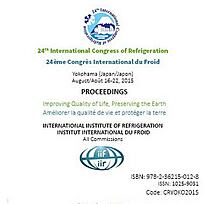
Document IIF
Étude expérimentale d'un cycle frigorifique à adsorption biétagé à trois lits utilisant FAM-Z01 et Z05 comme adsorbants.
Experimental study on a three-bed two-stage adsorption refrigeration cycle using FAM-Z01 and Z05 adsorbents.
Numéro : pap. n. 450
Auteurs : TAKAHASHI F., ENOKI K., AKISAWA A., et al.
Résumé
Utilization of the wasted heat is effective to reduce primary energy consumption for mitigating global warming problem. Multistage adsorption refrigeration cycles can be a candidate to utilize low temperature heat sources less than 70 degrees Celsius for air-conditioning. However multistage adsorption cycles have a disadvantage of large volume of the facility due to many adsorption beds, for instance, conventional twostage adsorption chillers have four-beds. This study proposes two-stage adsorption refrigeration cycle with three-beds which reduces one bed in comparison with conventional one. The operation of the cycle is different from that of conventional system as well. To estimate the performance of the proposed cycle using FAM Z01 and Z05. Static analyses on the Dühring diagram was employed to predict the cooling effect. Moreover, the performance of the cycle was investigated experimentally. The results verify that the cycle can work with the hot water of 60 degrees Celsius to produce chilled water of 12 degrees Celsius.
Documents disponibles
Format PDF
Pages : 8 p.
Disponible
Prix public
20 €
Prix membre*
Gratuit
* meilleur tarif applicable selon le type d'adhésion (voir le détail des avantages des adhésions individuelles et collectives)
Détails
- Titre original : Experimental study on a three-bed two-stage adsorption refrigeration cycle using FAM-Z01 and Z05 adsorbents.
- Identifiant de la fiche : 30015885
- Langues : Anglais
- Source : Proceedings of the 24th IIR International Congress of Refrigeration: Yokohama, Japan, August 16-22, 2015.
- Date d'édition : 16/08/2015
- DOI : http://dx.doi.org/10.18462/iir.icr.2015.0450
Liens
Voir d'autres communications du même compte rendu (657)
Voir le compte rendu de la conférence
Indexation
- Thèmes : Systèmes à absorption et adsorption
- Mots-clés : Adsorbant; Zéolite; Système biétage; Système à adsorption; Experimentation
-
Adsorption cooling using adsorbent-coated surfa...
- Auteurs : DUNNE S. R., TAQVI S. M.
- Date : 24/05/1998
- Langues : Anglais
- Source : Fundamentals of adsorption - FOA6. Proceedings of the Sixth International Conference.
Voir la fiche
-
Experimental study on a two-stage adsorption re...
- Auteurs : HAMAMOTO Y., AKISAWA A., HAGA N., et al.
- Date : 24/09/2002
- Langues : Anglais
- Source : Proceedings of the International Sorption Heat Pump Conference.
Voir la fiche
-
Adsorption heat pump with heat transfer between...
- Auteurs : SCHAWE D.
- Date : 24/05/1998
- Langues : Anglais
- Source : Fundamentals of adsorption - FOA6. Proceedings of the Sixth International Conference.
Voir la fiche
-
Solid adsorbents in open sorption systems for t...
- Auteurs : HAUER A., LÄVEMANN E.
- Date : 24/05/1998
- Langues : Anglais
- Source : Fundamentals of adsorption - FOA6. Proceedings of the Sixth International Conference.
Voir la fiche
-
Adsorption beds of zeolite on aluminium sheets.
- Auteurs : RESTUCCIA G., FRENI A., CACCIOLA G.
- Date : 24/03/1999
- Langues : Anglais
- Source : Proceedings of the International Sorption Heat Pump Conference.
Voir la fiche
